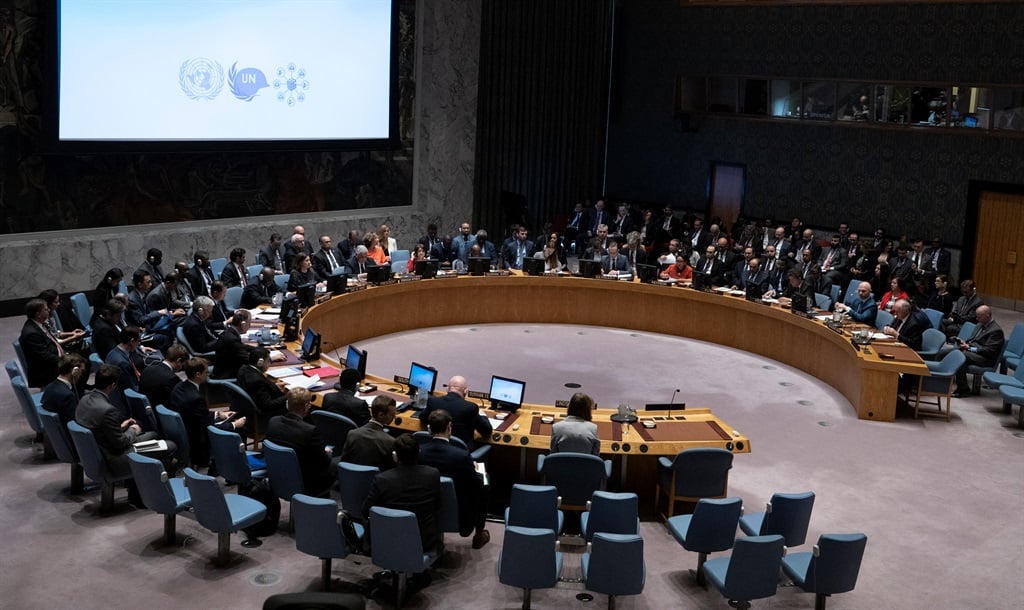

- The UN Security Council has resolved to offer logistical and technical support to the SAMIDRC through MONUSCO.
- Rwanda opposes this move which it says could result in a regional war.
- The DRC’s Felix Tshisekedi accuses predecessor Joseph Kabila of plotting an uprising against his establishment.
The United Nations Security Council (UNSC) has resolved to support the SADC Mission in the Democratic Republic of Congo (SAMIDRC), which is led by South Africa.
The mission has seen SA troops come under fire amid allegations that they are under-resourced and poorly supported, while up against M23 rebels who are nearly universally believed to be supported by Rwanda, despite its denials.
The Security Council has now agreed to underpin it with both intelligence and weapons.
Support to the SAMIDRC would be “through enhanced coordination, information-sharing and technical assistance” with the UN Organisation Stabilisation Mission in the DRC known as MONUSCO, the Security Council said.
The SAMIDRC will also have at its disposal, “use of MONUSCO’s logistical assets and military capabilities.”
That does not come without risk.
READ | US, EU sanction Congolese rebel commanders, including SA foes M23
“We remain concerned that the provision of air assets and armoured vehicles to facilitate the movement of SAMIDRC troops could inflame regional tensions at a fragile moment in the eastern DRC conflict,” said Robert Wood, the United States’ Alternative Representative for Special Political Affairs at the UNSC.
“We must ensure it does not.”
Rwanda’s Paul Kagame – branded a “criminal” by his Congolese counterpart Felix Tshisekedi – opposed the UNSC resolution on the basis that it could collapse the Great Lakes region into a war involving eight countries.
Back in Kinshasa, Tshisekedi alleged his predecessor Joseph Kabila, currently in Zimbabwe, is working with Kigali to destabilise him and, by extension, working with the M23 rebels.
Nobody wants war, says Rwanda
Rwanda does not want a war in North Kivu that would spread into its territory because that would affect the country’s crucial tourism sector, diplomatic sources from Rwanda told News24.
Tourism contributed R8.5 billion in foreign exchange earnings in 2022, just when the country was recovering from the Covid-19 global shutdown.
In the southern part of Rwanda, hotels can cost as much as R200 000 per night in areas known for activities such as gorilla tracking.
Tshisekedi was in Brussels at the weekend for a medical check-up, but still had time to speak to the media on Tuesday night.
In an interview with Top Congo, Tshisekedi reiterated his position of not negotiating with Kagame, and even less so with the M23 rebels.
ALSO READ | Radio show suspended, prominent musician reprimanded after criticising DRC army in fight against M23
There was, however, room for conversation, he said.
“What I am saying is that I want to talk with Rwanda, not negotiate with Rwanda, talk to ask Kagame, the criminal of his state, what does he have to do with my people,” he said.
Rwanda has constantly denied funding the M23 rebels despite evidence brought forward by the UN – alongside evidence that Tshisekedi was working with the Democratic Forces for the Liberation of Rwanda (FDLR) rebels.
Tshisekedi also claimed that his predecessor Kabila was working with Alliance Fleuve Congo (AFC) a coalition of rebel forces and opposition political parties in exile, including the M23 rebels.
He accused Kabila of plotting a putsch.
“Joseph Kabila boycotted the election and is preparing an insurrection because he is the AFC,” said Tshisekedi.
In late July, 25 people linked to AFC were tried by a military court.
Only five were in attendance while the rest were out of the country. Prosecutors want the death penalty to be handed down to those found guilty.
M23 gains more ground
SAMIDRC arrived in the eastern Congo on 15 December last year to take over from the East African Community’s (EAC) standby force. The current forces falls under the command of South Africa, with Malawi and Tanzania also contributing soldiers.
When the EAC left, Burundian forces remained in the DRC thanks to a bilateral agreement.
However, Burundian soldiers have been refusing to go into battle, resulting in some being court-martialed.
Almost eight months into the battlefront, SAMIDRC has reported a number of casualties as the M23 rebels gained more ground, taking over key villages and cities.
READ MORE | Rwanda shuts down 185 churches – so far
This weekend, while a ceasefire agreed on in Luanda but not signed off by M23 was supposedly in effect, the M23 rebels captured Ishasha, a town at the border with Uganda.
M23 rebels now control all movement along Lake Edward, which borders DRC and Uganda.
This presents a challenge to DRC’s alliance with the Ugandan government in fighting Allied Democratic Forces (ADF) rebels.
The News24 Africa Desk is supported by the Hanns Seidel Foundation. The stories produced through the Africa Desk and the opinions and statements that may be contained herein do not reflect those of the Hanns Seidel Foundation.
